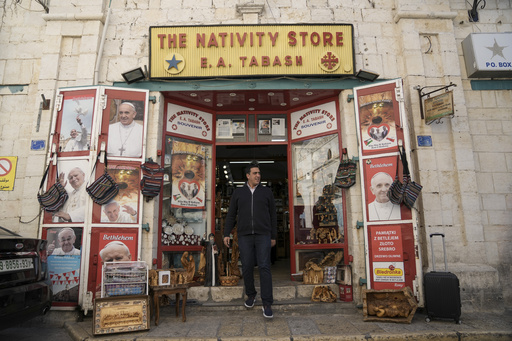
“`html
BETHLEHEM, West Bank — The Nativity Store, situated in Manger Square, has been a provider of intricate olive wood carvings and various religious items since 1927. However, with Bethlehem approaching its second Christmas amid the ongoing conflict in Gaza, tourist numbers have dramatically dwindled, causing significant uncertainty for the Nativity Store and many other businesses facing potential closure.
This year, Bethlehem’s festive Christmas spirit remains subdued, reflecting the realities of the war in Gaza. There will be no elaborate Christmas tree in Manger Square, no lively marching bands, and very few public decorations or festivities to brighten the atmosphere.
“Last year, we had more hope, but as we near Christmas again, we find ourselves lost,” lamented Rony Tabash, third-generation proprietor of the Nativity Store. The hostility, which has persisted for almost 15 months, shows no sign of resolution, with numerous ceasefire negotiations proving ineffective.
Tourism in Israel and the Israeli-occupied West Bank has suffered a drastic decline since the outbreak of the conflict. Additionally, the Israeli government has restricted the entrance of approximately 150,000 Palestinians who had jobs within Israel’s borders, leading to a sharp 25% contraction in the Palestinian economy over the past year.
Christmas festivities in Bethlehem, typically a celebratory event uniting Armenian, Catholic, and Orthodox communities, generally serve as a crucial economic lifeline for the area, which relies on tourism for 70% of its annual income. Unfortunately, this holiday season has left its streets nearly deserted.
Although Tabash keeps his store open daily, it is not uncommon for an entire week to pass without a single sale. He collaborates with over 25 local artisans who meticulously craft religious items from the region’s well-known olive wood. However, as sales dry up, these artisans are losing work opportunities.
Visitor numbers have drastically decreased from approximately 2 million annual tourists in 2019 to fewer than 100,000 this year, according to Jiries Qumsiyeh, spokesperson for the Palestinian tourism ministry. Echoing the Nativity story wherein Mary gave birth to Jesus in a stable due to a lack of lodging, virtually all of Bethlehem’s 5,500 hotel rooms now sit vacant.
Elias Al Arja, president of the Bethlehem Hoteliers Association, reported that hotel occupancy rates plummeted from around 80% earlier this year to approximately 3% presently. He has had to let go of over 120 employees, retaining only five to keep his own establishment, the Bethlehem Hotel, operational.
Bethlehem is home to more than 100 shops and 450 workshops dedicated to traditional Palestinian crafts. However, just days before Christmas, Manger Square appeared largely deserted, with only a few locals selling coffee and tea, and only two of the eight shops along the main avenue remaining open.
Qumsiyeh expressed concern that the prolonged conflict might lead to a loss of traditional craftsmanship vital to Palestinian culture. Many families are opting to emigrate. “We have seen a significant increase in emigration, particularly among those in the tourism industry,” he noted.
Approximately 500 families have relocated out of Bethlehem in the last year, according to Mayor Anton Salman. These figures reflect only those who secured official residency visas, while many more have left on temporary tourist visas, complicating their return prospects.
About half of Bethlehem’s population, including surrounding villages, relies on tourism or related jobs in Israel. The unemployment rate in Bethlehem currently hovers around 50%, with the West Bank experiencing an average rate of 30%, as reported by the Palestinian Economy Ministry.
For Salman, foregoing Christmas festivities is a way to shed light on the hardships faced in Bethlehem and within Palestinian territories. “This year, we aim to demonstrate to the world that the Palestinian people are still enduring immense suffering, devoid of the joy that others around the globe might experience,” he stated.
This situation contributes further to a dwindling population in the Holy Land, exacerbated by a combination of emigration and a declining birthrate. The Christian minority comprises a small segment of the population; estimates suggest around 182,000 Christians in Israel, 50,000 in the West Bank and Jerusalem, and only 1,300 in Gaza, according to U.S. State Department figures.
Father Issa Thaljieh, parish priest of the Greek Orthodox Church within the Church of the Nativity, remarked on the financial struggles faced by many families, which hinder their capacity to pay rent, school fees, or engage in meaningful holiday celebrations. Though church social services have attempted to assist, the needs remain overwhelming.
Thaljieh’s Christmas message this year centers on encouraging Bethlehem’s residents to remain resolute despite the prevailing difficulties. “A church without Christians ceases to be a church,” he emphasized, as preparations continued in the vast, empty church just one week prior to the holiday.
“The light that emerged with Jesus Christ’s birth here transcends darkness, thus we must remain patient, continue to pray, and uphold our heritage, as our roots are firmly planted in Bethlehem,” he urged.
Amid these challenges, some families are discovering ways to recapture fragments of joy. Nihal Bandak, a 39-year-old Bethlehem resident, decided to fulfill her three children’s wish for a Christmas tree this year, a tradition they had skipped last year. Her youngest daughter, eight-year-old Stephanie, particularly cherishes decorating the tree.
“For me, it is a mix of joy and sadness,” said 11-year-old Mathew Bandak. “I’m thrilled about our celebration and decorating, but I also think of those in Gaza who have nothing to celebrate.”
Rony Tabash, proud keeper of the Nativity Store, affirms that he will persist in opening the shop, recognizing it as part of his family’s heritage. “Although we don’t feel the essence of Christmas, the spirit lies within our hearts,” he reflected, expressing the collective hope for peace and a ceasefire within the city. “We firmly believe that Christmas will bring a guiding light in the darkness.”
“`

